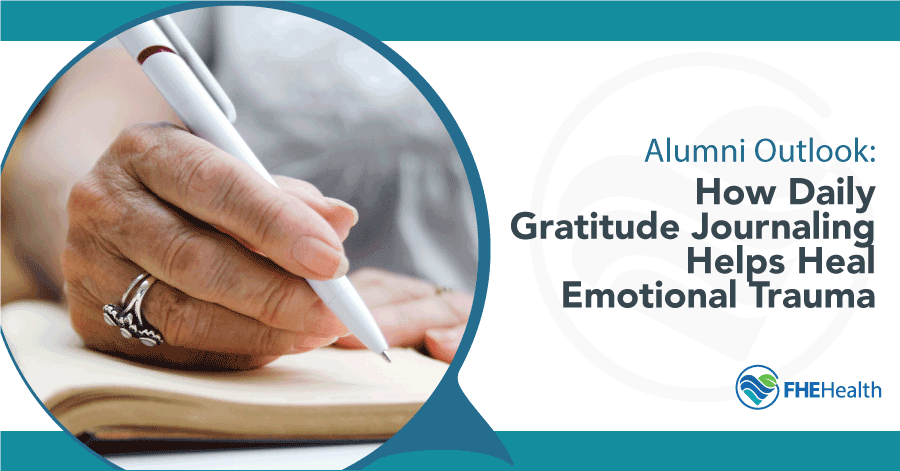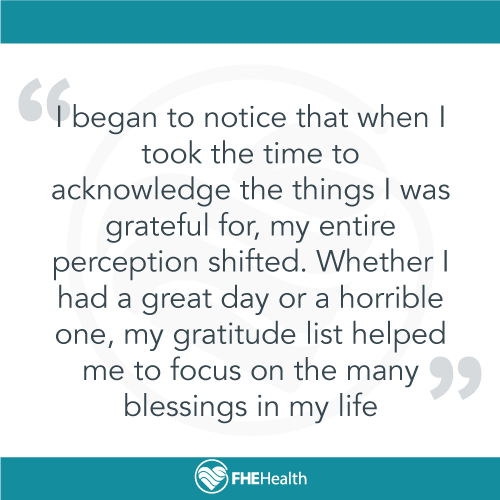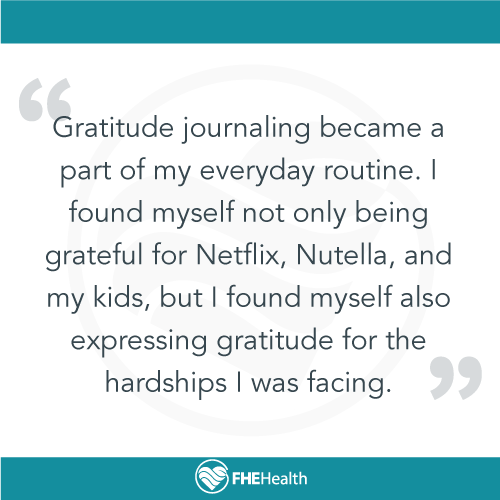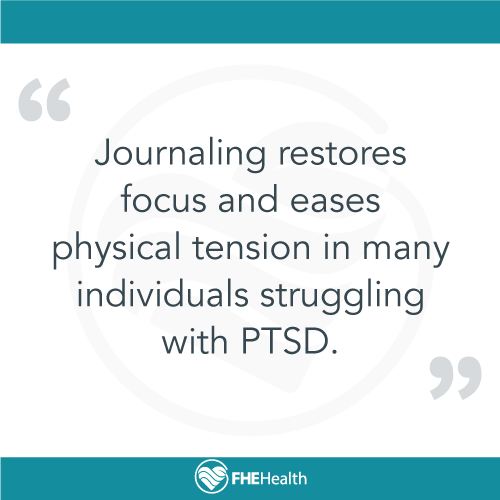
Gratitude journaling is known as the foe of every recovering alcoholic. I was no exception to judging this therapeutic activity before ever actually trying it. After all, what could I possibly be grateful for? I was embarking on my recovery and coming to terms with the fact that I was suffering from the chronic disease of addiction, as well as severe PTSD. Grateful was the last adjective I would use to describe my mindset during the time it was suggested that I give journaling a try.
After one relapse, an abusive relationship, and years of sobering, self-propelled misery, I stumbled into a sponsorship family that required a daily gratitude list. I was added to a group text message in which I was required to report at least three things I was grateful for each day. My first thought was how I could find a more natural, softer way to avoid indulging in this seemingly mindless suggestion. However, accountability came by way of my sponsee sisters, along with my sponsor. I remember painfully participating in the “kumbaya” texts messages and not understanding the method behind the madness.
 Slowly but surely, I found myself reading the gratitude lists of everyone in the group. Not only did some of their submissions inspire me, but I found that many of them were adding unpleasantries and misfortunes into their gratitude. My mind was blown. How could these women seriously be grateful for their painful experiences? The idea of intimately connecting to a sponsorship family is to learn HOW to be a sober woman of dignity, grace, and integrity. These qualities were foreign to me before I got sober.
Slowly but surely, I found myself reading the gratitude lists of everyone in the group. Not only did some of their submissions inspire me, but I found that many of them were adding unpleasantries and misfortunes into their gratitude. My mind was blown. How could these women seriously be grateful for their painful experiences? The idea of intimately connecting to a sponsorship family is to learn HOW to be a sober woman of dignity, grace, and integrity. These qualities were foreign to me before I got sober.
Over time, I began to experience the promises of “not regretting the past nor wishing to shut the door on it.” What started out as a reluctant group text message became a total change in perception. I wanted to dive deeper. I began to realize that I wasn’t alone. Some days were better than others. The transparency and willingness of my sponsee sisters encouraged me to take a look further into why I was so afraid of being vulnerable. The truth is, I was triggered by the painfully traumatic memories of my past.
I had been diagnosed with PTSD, but never actually thought twice about it. It wasn’t until I was in enough pain that I was willing to look at why I am the way I am. I acquired a lust for understanding why my behaviors didn’t match the morals and values I began to establish within myself. I started seeing a trauma therapist weekly, and it wasn’t long before I came to understand the intricate nature of PTSD. You see, my body would react to triggering situations long before my brain ever had a chance to rationalize what was actually happening. Therefore, I spent most of my days reacting rather than taking the time to pause and respond.
This realization was the seed of liberation for me. My therapist suggested I continue on with my 12-Step Fellowship involvement, daily gratitude lists, and also journaling. I began to notice that when I took the time to acknowledge the things I was grateful for, my entire perception shifted. Whether I had a great day or a horrible one, my gratitude list helped me to focus on the many blessings in my life. This intentional reflection cultivated a necessary pause in my reaction to things that triggered me. Gratitude journaling became a part of my everyday routine. I found myself not only being grateful for Netflix, Nutella, and my kids, but I found myself also expressing gratitude for the hardships I was facing. I began to find purpose in my pain.
PTSD and the Benefits of Gratitude Journaling
 Journaling has been proven by many psychology professionals to counteract stress, shift negative thought patterns, improve cognitive function, and even improve the immune system. Gratitude journaling has been scientifically proven to help these individuals suffering from PTSD cope with anxiety and anger effectively. Journaling restores focus and eases physical tension in many individuals struggling with PTSD. Gratitude journaling has led to the discovery of not only facing post-traumatic stress but fostering post-traumatic growth. Many individuals struggling with PTSD find that there are many incredible benefits to overcome their traumatic pasts.
Journaling has been proven by many psychology professionals to counteract stress, shift negative thought patterns, improve cognitive function, and even improve the immune system. Gratitude journaling has been scientifically proven to help these individuals suffering from PTSD cope with anxiety and anger effectively. Journaling restores focus and eases physical tension in many individuals struggling with PTSD. Gratitude journaling has led to the discovery of not only facing post-traumatic stress but fostering post-traumatic growth. Many individuals struggling with PTSD find that there are many incredible benefits to overcome their traumatic pasts.
The benefits of gratitude journaling are not only very personal to me, but scientific studies back them. Here are a few tips for how to embark on gratitude journaling:
Steps for Gratitude Journaling
 Find a quiet and comfortable space to sit down with a pen and paper. (Quiet for you may include low playing music or white noise. That’s okay, just be sure you are as comfortable as possible and free of heavy distractions.)
Find a quiet and comfortable space to sit down with a pen and paper. (Quiet for you may include low playing music or white noise. That’s okay, just be sure you are as comfortable as possible and free of heavy distractions.)- Take a few minutes to meditate before journaling. Clear your mind of anything distracting you and allow yourself the space to focus on the present moment.
- Begin writing about whatever comes to your mind: any stress from your day, then shift focus to what you are grateful for, don’t judge what comes out on paper. Take the time to let the pen flow.
- Once you have finished writing, take time to recognize how you are feeling – emotionally, spiritually, and physically.
- Repeat steps 1-5 daily and notices how your journaling cultivates peace and healing.
Things to Remember While Journaling
- Do not focus on grammar or spelling. Allow yourself to get all of your thoughts and feelings down.
- Try to be as descriptive as possible. Be intentional and thorough in your journal entries. Be mindful of how you feel, what you see, smell, hear.
- SPARE THE JUDGMENT. Journaling is for you to let everything out on paper and to be rigorously honest with yourself.
- Don’t push yourself too hard but also be accountable. If you notice you are forcing your writing, maybe take a break and come back later.
- Over time, you will begin to see how your perception of life changes. Do not judge yourself, but instead notice the growth.






